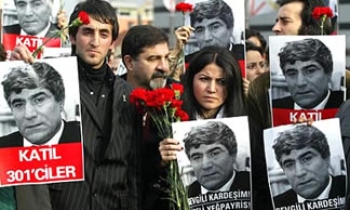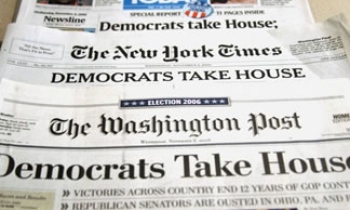BRUSSELS, Belgium (UPI) -- The European Union`s homeland security chief suggested Monday that the Danish paper Jyllands-Posten was wrong to have published 12 caricatures of the prophet Mohammed.
Since the cartoons` republication last month, almost 50 protestors have died in violent demonstrations, Christian churches have been torched and European and American embassies have been attacked across the Muslim world.
Speaking at a conference on press freedom in Brussels, EU Commissioner for Freedom, Justice and Security Franco Frattini condemned the violence, intimidation, and calls for boycotts of European firms as 'completely unacceptable.'
'No dialogue is possible with those who would threaten fundamental human rights, nor with those who would resort to terror,' he told a meeting organized by the International Federation of Journalists and the International Freedom of Expression Exchange.
The former Italian foreign minister also made an impassioned plea for the right to free speech and expression, saying they were non-negotiable.
'Freedom of expression must be defended, possibly most of all when ideas shock or disturb.'
But when asked by United Press International whether he would have chosen to print the caricatures if he was a newspaper editor, Frattini replied: 'I would not have published those cartoons. It should have been clear given a broad assessment of the context and circumstances.'
Frattini`s position, which also appears to have the backing of EU foreign policy chief Javier Solana, is that journalists must impose a form of self-censorship in order not to offend the sensibilities of Muslims, and other religious groups. 'Any publication or republication should take into account the international political context, in particular in the Muslim world,' said Frattini, pointing out that it was 'unwise' for European papers to republish the cartoons just three days after the victory of the militant Islamist group Hamas in Palestinian elections and following recent remarks about Israel and the Holocaust by Iranian President Mahmoud Ahmadinejad.
The General Secretary of the IFJ, which represents over 500,000 journalists worldwide, leapt to the defense of the Danish paper at the center of the storm. 'There was a good journalistic reason for those cartoons to be published,' said Aidan White, describing the violent reactions as 'intolerable.'
Robert Russell, president of the American Cartoonists Rights Network, also defended the decision to publish the drawings of Mohammed, which are forbidden by Islamic law. 'For cartoonists not to have drawn those caricatures would have been crazy,' he said on the fringes of the Brussels conference. 'Should Picasso not have painted `Guernica` or Goya not have drawn his cartoons or Theo van Gogh (the Dutch director who was slain by a Jihadist in 2004) not have made his film?'
Last week, the IFJ adopted a statement calling on the media 'not to do anything that would create unnecessary tension by promoting hatred or inciting violence,' but said it was the sole responsibility of journalists to set their own ethical standards. 'There is no role for the government in the newsroom,' White told UPI. Rejecting calls for a new code of conduct to govern reporters` behavior, IFJ members agreed to work with colleagues from Arab and Muslim countries to defuse the escalating cartoon crisis.
The journalist body is worried that religious fanatics in countries not renowned for their press freedom are using the cartoons crisis to crush independent media. 'There is a great deal of concern that there is a fundamentalist religiosity emerging that is demanding that we suspend our right to free expression,' White told delegates to the international conference.
Newspapers have been shut down and journalists have been arrested in Algeria, Jordan, Syria, Russia and the Yemen for republishing the cartoons. The editor of France Soir, the first newspaper to reprint the drawings, was also sacked by the paper`s Egyptian owner. 'At a time when international tensions are high, particularly in the Middle East, it is appalling that journalists are being jailed for carrying out their professional duties,' said IFJ President Christopher Warren.









